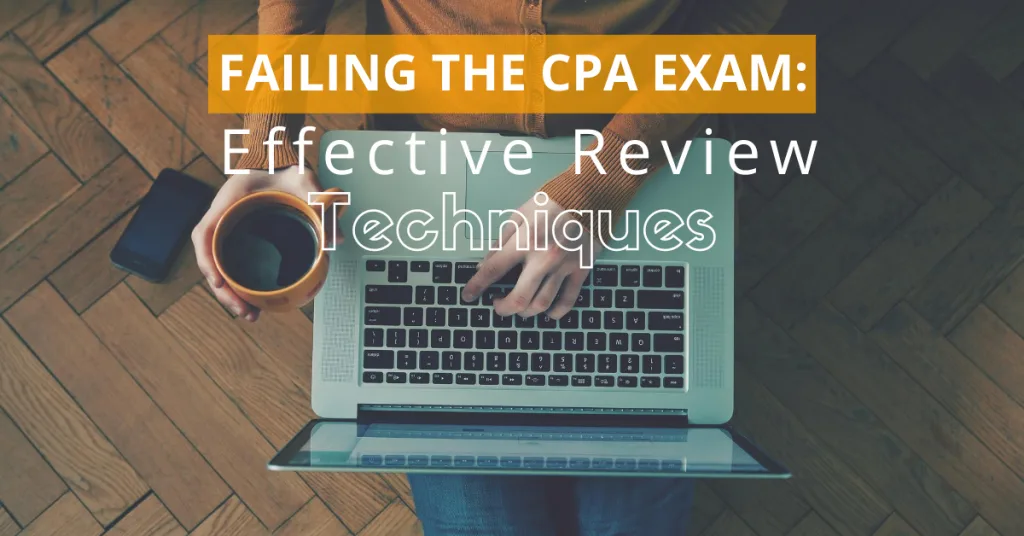But after the emotional roller coaster subsides, it’s important to remember that there’s always a silver lining. Use this experience to positively reinforce where you went wrong and what your next plan of action is to get back on the horse.
Pass the CPA Exam on Your First Try!
Download your FREE CPA Exam Game Plan to successfully navigate the CPA Exam and pass faster!
The first step is to of course analyze why you failed.
Take a look at your score report and pinpoint your strengths and weaknesses–then see if this reflects your performance while you were studying. Also, it’s important to do an overall self-assessment by analyzing the following:
- Did you stick to your study schedule?
- After each study session, did you meet your study goal? Did you evaluate what you got out of it? Where could you improve and what were you confident about?
- Are you legitimately studying?
- Did you not have enough time?
- Were you unable to prioritize your exam over other things going on in your life?
- Did you watch all the lectures and do the practice questions?
- What else could have affected your failing score?
Here are some methods and techniques that are recommended by our expert CPA Exam moderators that have helped many candidates achieve the extra points they needed to pass a failed section.
Execution on practice problems is important.
Execution is proof of knowledge. It’s not enough to look at the answer explanations for the questions you missed on a quiz and think, ‘Oh, yeah, I knew that,’ and mentally bump up your score. You need to understand the material well enough to score 85-90% on each quiz the first time. You don’t truly know something until you execute it correctly each time. As any classical musician will tell you, you don’t really know a piece until you can flawlessly execute all of its hardest passages 5x in a row, each.
Improve your odds, question by question.
When you’re practicing on Multiple Choice Questions (MCQs), eliminate clearly wrong answers as part of your answering process. This helps enormously with difficult questions. The logic here is the age-old utilization of the process of elimination. If you can narrow down your answers by throwing out the ones you know to be incorrect, your odds of picking the right answer increase.
Teach the material to someone else.
This can be a real-life study buddy or just someone imaginary. As Roger puts it, “you think you really understand something until you try to explain it to someone else!”
In other words, don’t just ‘do’ MCQs and Task-Based Simulations (TBSs) while reviewing your performance; ‘teach’ why the correct answers are correct and why the wrong answers are wrong. Create your own in-depth flash cards encapsulating things you learned from your MCQ and TBS study and go over them often.
Totally prioritize studying, period.
One of the simplest and yet most difficult things for candidates to do sometimes is prioritize their studying needs above everything else. If you want to pass the exam, it’s important to dedicate some hours of intensive study time to put the above suggestions into practice and improve your score. Here are some things our candidates have found helpful to do just that:
- Download an app that will block everything on the internet except your CPA review materials.
- Delete phone apps and turn off all phone notifications.
- Inform all friends and family that you will be completely unavailable during your blocks of study time.
- Stock up on easy-to-prepare food or prepare a few days’ worth of food in advance.
- Stock up on coffee.
- Shut yourself off from the world and live in front of your computer during your study times.
These measures may seem draconian but are well worth not having to study for an exam section again.
Avoid falling into the trap of memorizing answers to practice problems.
This is something that many candidates either consciously or unconsciously end up doing; however, this is of course a pitfall for failure since memorizing and understanding a concept are two very different things. To get out of this habit, mix things up.
Here is how that would work: Say you want to really concentrate on Sections 1-3 for a few days. Instead of doing only Section 1 one day, then only Section 2 the next, etc. – mix it up:
- Do a few Section 1 quizzes with no repeats. After each quiz, review what you got right and study/retrain on what you got wrong. Write down notes for getting those wrong ones right next time.
- Now, instead of going back and doing more Section 1 quizzes, do Section 3 quizzes. Again, review what you got right and study/retrain on what you got wrong.
- Next – do some Section 2 quizzes. Same review/retrain steps.
- Now – go back and work on Section 1 again. Same study/retrain steps after.
Do these steps until you’ve gotten through all the Sections 1-3 questions.
Do cumulative reviews every so often.
Progress tests are key. Create or take cumulative quizzes so that you don’t forget the information you learned an hour, a day, or a week ago. For example, if you finish learning one chapter, test your knowledge on that chapter alone. You can probably take a 30 question quiz to test yourself on your understanding. Afterward, go back and take a cumulative quiz that combines 3 or 4 chapters’ worth that you’ve already done.
Doing this often will help reinforce and retain your knowledge, keeping information you learned fresh regardless of when you learned it.
Take the easy route, use SmartPath Predictive Technology™
As a Roger CPA Review Student, your CPA review course is equipped with SmartPath Predictive Technology. Instead of wasting time trying to figure out which areas of the Exam need most of your attention, SmartPath™ automatically tracks your progress to targeted goals. These targets help you easily figure out where you need to focus your study efforts. Pass the CPA Exam quickly by learning more about SmartPath.
Ready to start passing?





